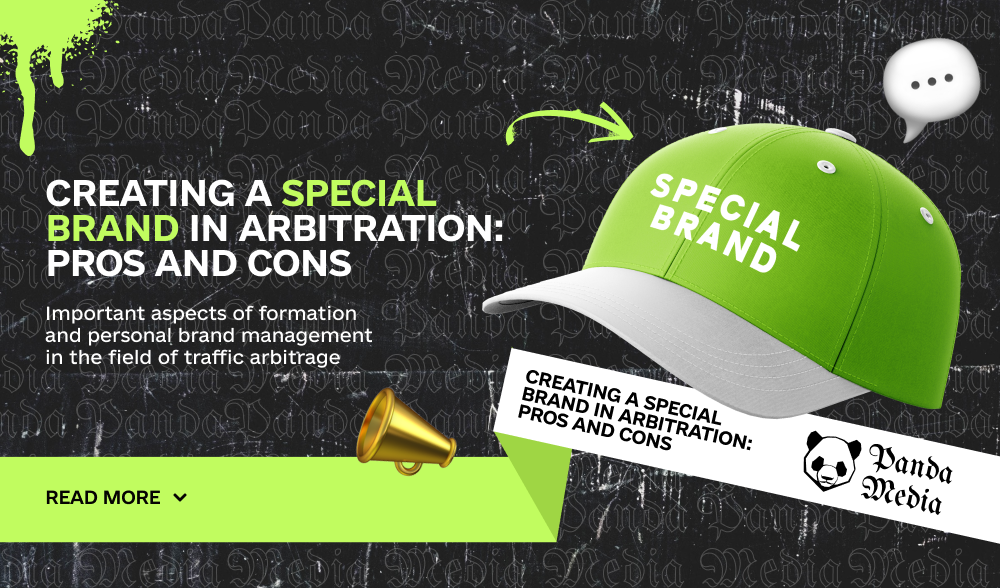Creating a personal brand in arbitrage: pros and cons
A personal brand is a recognizable image of an individual, formed in public opinion. It combines unique knowledge, skills, outstanding character traits, style, unique features, ideas, and points of view on various topics.
The main attributes of a personal brand are reputation and audience reach. Large reach is not always necessary the key is to influence your target audience and establish yourself in a professional field.

Reputation is extremely important. It can take years to build, but one bad comment or action can ruin it all. In such cases, great coverage can play to your detriment, causing you to lose your audience, and it can be difficult to rebuild a good name.
Why is it important for an arbitrageur to have a personal brand?
The primary purpose of any media resource or blog is self-presentation. This is especially true in arbitration, where it is important to demonstrate one’s competitiveness in the industry and professionalism as an expert.
A personal brand serves as a kind of business card that helps establish a quick connection with the target audience. Regardless of experience level, creating a personal brand helps an arbitrageur stand out among their peers. Publishing unique content about one’s knowledge and experience in a blog strengthens the audience’s confidence in the author’s competence and reliability.
The peculiarity of personal blogs is that the author and his subscribers are on the same page. Sharing professional jokes, and expert information, and discussing new resources in the field creates a cozy information space. Subscribers see that the author shares their interests. In addition, they have the opportunity to ask questions on the topic and receive answers, which contributes to mutual development: the author of the blog strengthens his authority and reputation, and subscribers receive valuable information from an expert.
Although some authors may close comments or set strict communication rules, most strive to keep their channels open. This makes it easier to create communities with common interests.
Strategies for promoting a personal brand
To effectively promote your brand, utilize social media, and websites, participate in public events, and engage in publicity. Let’s take a closer look at each of these methods.
Use Instagram
Instagram is a key platform for promoting a personal brand. Creating high-quality content with eye-catching visuals and useful content will help your posts get into recommendations, increasing reach. Use themed hashtags and location tagging to improve visibility.
Publish stories regularly, live-stream and save them. Record short video Reels – Instagram often increases its visibility, which helps attract new followers.
Targeted advertising is also effective if set up properly and prepare your profile to receive new followers. It is recommended to manage ad campaigns through Facebook Ads Manager for more detailed customization.
Collaborate with bloggers who have a large reach and use reciprocal PR with other professionals who are not your competitors.
When you reach a certain number of subscribers, create a post that tells a story about yourself and ask subscribers to share information about themselves in the comments.
Follow accounts in your field and actively comment on their posts, demonstrating your expertise. This will help attract the attention of your target audience.
This will help you attract the attention of your target audience.
YouTube for Personal Brand
YouTube provides great opportunities for personal brand development. Create videos with educational content, share your knowledge, debunk common myths in your field, and post reports from events you’ve attended. Educational content on YouTube helps promote your services, as potential clients may come across your videos through search queries.
TikTok for Branding
TikTok is characterized by its ability to promote organically and the availability of a paying audience, making it popular among experts for personal brand development. According to Mediascope, as of August 2021, the number of professional accounts has reached 835,500.
Telegram for Promotion
Telegram channel is an effective promotion tool where you can post useful information, announcements, social media, or YouTube links. Content can be unique or adapted from Instagram. Telegram is also a good place to buy advertising in popular channels or mutual promotion.
Use Other Social Networks
Personal brand promotion is also possible on other social networks such as Twitter if your target audience is active there. Choose a few main channels to focus your efforts.
Building Your Website
Websites provide additional opportunities to expand your reach and build credibility. To promote a website in search engines, it is necessary to conduct:
- SEO analysis of competitors;
- development of semantic core;
- content optimization;
- page markup for search engines;
- placement of quality external links;
- creating human-readable internal links;
- fixing technical errors;
Key Mistakes When Working on a Personal Brand
When developing a personal brand, it is crucial to avoid certain mistakes.
Choice of Style and Tone of Communication
The first thing to do is to carefully consider the style and tone of communication with your audience. The wrong choice can alienate potential subscribers. In some contexts an informal address is more appropriate, in others – a formal style. It is important to understand the preferences of your target audience and the specifics of your niche.
Inconsiderate Speeches and Actions
Carefulness in statements and actions is critical, as a single mistake can cause significant reputational damage. For example, Regina Todorenko faced negative repercussions after her comments about domestic violence. This resulted in the loss of Glamour’s Woman of the Year title and brand collaborations, as well as causing public outrage. It is important to realize that rebuilding a reputation requires significant effort, and sometimes even that may not be possible.
Ability to Delegate
Delegate tasks with care. At the beginning of your blogging journey, it is preferable to write texts yourself to maintain a unique style. Later, you can delegate this task to a copywriter, if he can adequately reproduce your style.
On the other hand, if you don’t have skills in certain areas such as video editing or photo processing, it is better to turn to professionals. Also, if you have a lot of work to do, you should consider hiring an assistant.
Ignoring the Audience
It’s important to pay attention to your subscribers. Be sure to respond to comments and messages, especially when they relate to your expertise. This approach helps build a loyal relationship with your audience and helps increase engagement in the comments.
Lack of Serious Approach
A common mistake is seeing personal brand development as just a hobby. In reality, it is a serious and professionally demanding endeavor.
It is a serious and demanding endeavor.
Your brand is inextricably linked to your personality. While the media image may be different from the real thing, it’s important to stay true to your true values. If you promote ideas that are foreign to you, this will eventually become apparent. Make sure that your activities and messages do not discredit the image you have created.

The cons of personal brand in arbitrage
Despite the obvious benefits of publicity for arbitrageurs, many of them prefer to stay in the shadows. For example, if someone engages in questionable activities, creating a personal brand can have negative consequences such as public criticism, haters, or even trouble with the law.
Creating a public blog and connecting with your audience requires a lot of responsibility. No one wants to lose the trust and support of the audience because of questionable actions. Maintaining a personal brand is essentially an investment in reputation, and aspiring arbitrageurs need to be conscious of this.
In addition, in the arbitration industry, reacting quickly to new trends and ideas is extremely important. Often information published in the public space quickly loses its relevance and cost-effectiveness. There is also a risk of attracting the attention of law enforcement agencies, especially when it comes to “gray” money-making schemes.
That’s why many arbitrageurs prefer to remain anonymous and stay off social media, believing it makes it easier to focus on their work and minimize the risks associated with their activities.
There are, however, those who choose the path of publicity. It is important to understand whether the disadvantages of such a strategy really outweigh its advantages, or whether the pros of a public image still prevail.
FAQ
What is a personal brand?”
A personal brand is a unique set of qualities, characteristics, skills, and experiences that create an image of a person in the public mind. It is how people perceive you as a professional or public figure.
Why is a personal brand important?
Personal brand is important for establishing trust and recognition. It helps you stand out in a crowd, attracts the right audience and potential clients, and strengthens your professional reputation.
How to start building a personal brand?”
Start by identifying your core values, strengths, and unique skills. Identify your target audience and how you want to be perceived. Then start working on your image on social media, professional platforms, and through personal contacts.
How to avoid mistakes when working on your brand?”
To avoid mistakes, be consistent and sincere in your message, keep your communication professional, and avoid making rash statements that can damage your image. It’s also important to listen and respond to feedback from your audience to build rapport and trust.
What are the benefits of building a personal brand in arbitrage?”
Creating a personal brand in arbitrage establishes you as an expert in your niche, improves the perception of your professionalism, and increases the trust of clients and partners. A personal brand also helps expand your network of contacts and can open up new opportunities to collaborate and grow your revenue.
What risks are associated with building a personal brand in arbitrage and how to minimize them?”
The main risks in building a personal brand in arbitrage are potential criticism and negative perception, especially if you are working with “gray” schemes. To minimize these risks, it is important to strictly follow the law, maintain transparency and honesty in your publications, and be prepared to engage constructively with your audience. It is also important to have a clear strategy and understand what aspects of your business you are willing to share publicly.


